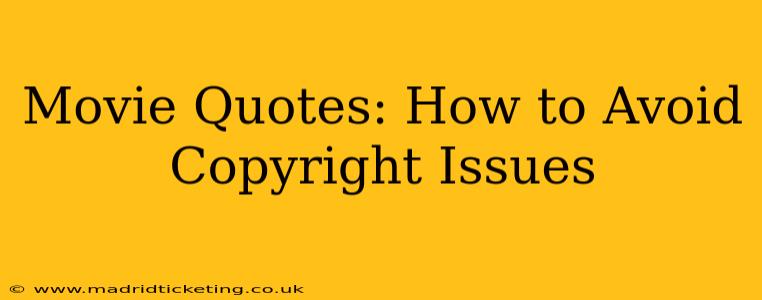Using movie quotes can add flair and relatability to your work, whether it's a blog post, a social media update, or even a creative writing project. However, navigating the murky waters of copyright law when it comes to movie quotes requires careful consideration. This comprehensive guide will help you understand the complexities and learn how to use movie quotes legally and ethically.
What is Copyright and How Does it Apply to Movie Quotes?
Copyright protects original works of authorship, including the screenplay, dialogue, and music of a film. This protection extends to the specific wording of movie quotes. Simply put, the copyright holder (typically the studio or production company) owns the exclusive right to reproduce and distribute the copyrighted work. Using someone else's copyrighted material without permission could lead to legal trouble.
Can I Use Movie Quotes at All?
The short answer is: it depends. The fair use doctrine provides a limited exception to copyright law. However, determining whether your use constitutes fair use involves a complex four-factor test:
- The purpose and character of the use: Is it transformative (adding new meaning or message) or purely commercial? Transformative uses are more likely to be considered fair use.
- The nature of the copyrighted work: Is it fictional or factual? Factual works are generally given less protection.
- The amount and substantiality of the portion used: Using only a small, insignificant portion is more likely to be considered fair use than using a large, essential part.
- The effect of the use on the potential market for or value of the copyrighted work: Does your use harm the market for the original movie?
How Can I Use Movie Quotes Without Infringing Copyright?
Several strategies can help you minimize the risk of copyright infringement when using movie quotes:
- Use short, transformative quotes: Instead of quoting long passages, opt for short, memorable phrases that serve as illustrative examples within a larger context. Analyze the meaning and significance of the quote rather than just repeating it verbatim.
- Clearly attribute the source: Always credit the movie and its creators. This shows respect for their work and helps avoid accusations of plagiarism.
- Parody or satire: Creating a parody or satire often falls under fair use, as it transforms the original work into something new and comedic. However, the transformative nature must be clearly evident.
- Commentary or criticism: If your work analyzes or critiques the movie, using brief quotes to support your arguments can be considered fair use. Focus on your analysis, not simply repeating the quotes.
- Transformative Use: Consider changing the quote slightly or creating new context to alter the original meaning, which can be considered a transformative use.
- Obtain permission: The most foolproof method is to secure permission directly from the copyright holder. This often involves contacting the movie studio or its licensing department. While this is the safest approach, it might be difficult to get permission, especially for small-scale projects.
What are the Consequences of Copyright Infringement?
Using movie quotes without permission can result in several negative consequences, including:
- Cease and desist letters: Copyright holders may send you a letter demanding you remove the infringing material.
- Lawsuits: You could face legal action, potentially leading to significant financial penalties and legal fees.
- Damage to reputation: Being accused of copyright infringement can damage your credibility and professional reputation.
How do I know if my use is Fair Use?
Fair use is determined on a case-by-case basis, making it difficult to predict with certainty. There is no magic formula. The best approach is to carefully consider the four factors and strive for transformative use whenever possible. If you have any doubts, consulting a legal professional specializing in copyright law is highly recommended.
Are there any exceptions to copyright for movie quotes?
While there's no blanket exception for movie quotes, some uses might fall under fair use, as explained above. Educational purposes often benefit from more lenient interpretations of fair use, but always strive to use only the necessary portions and attribute properly.
By understanding the legal landscape and applying these strategies, you can confidently use movie quotes while avoiding copyright issues and maintaining ethical practices. Remember, respect for intellectual property is essential. Always prioritize responsible and legal use of copyrighted material.

